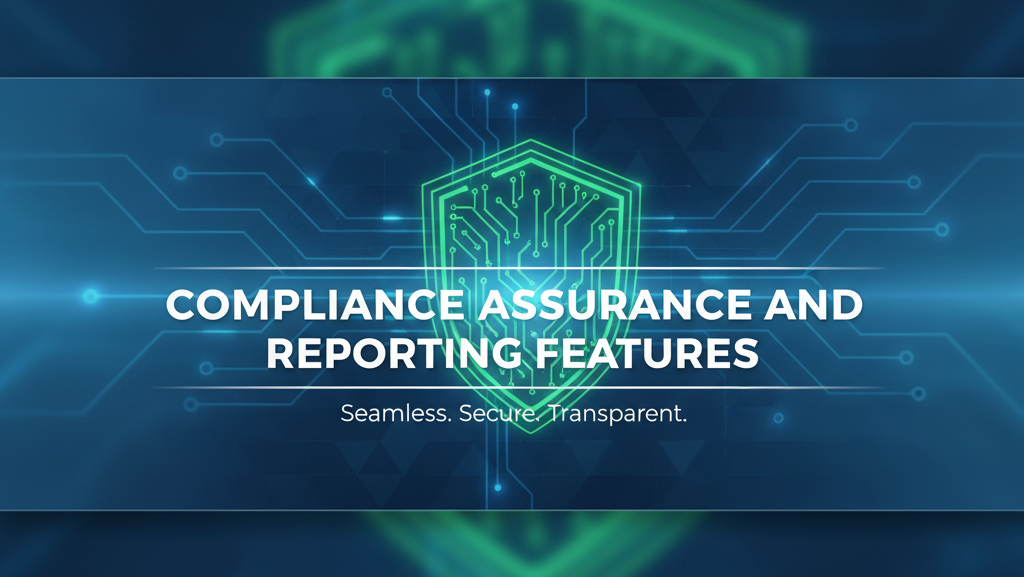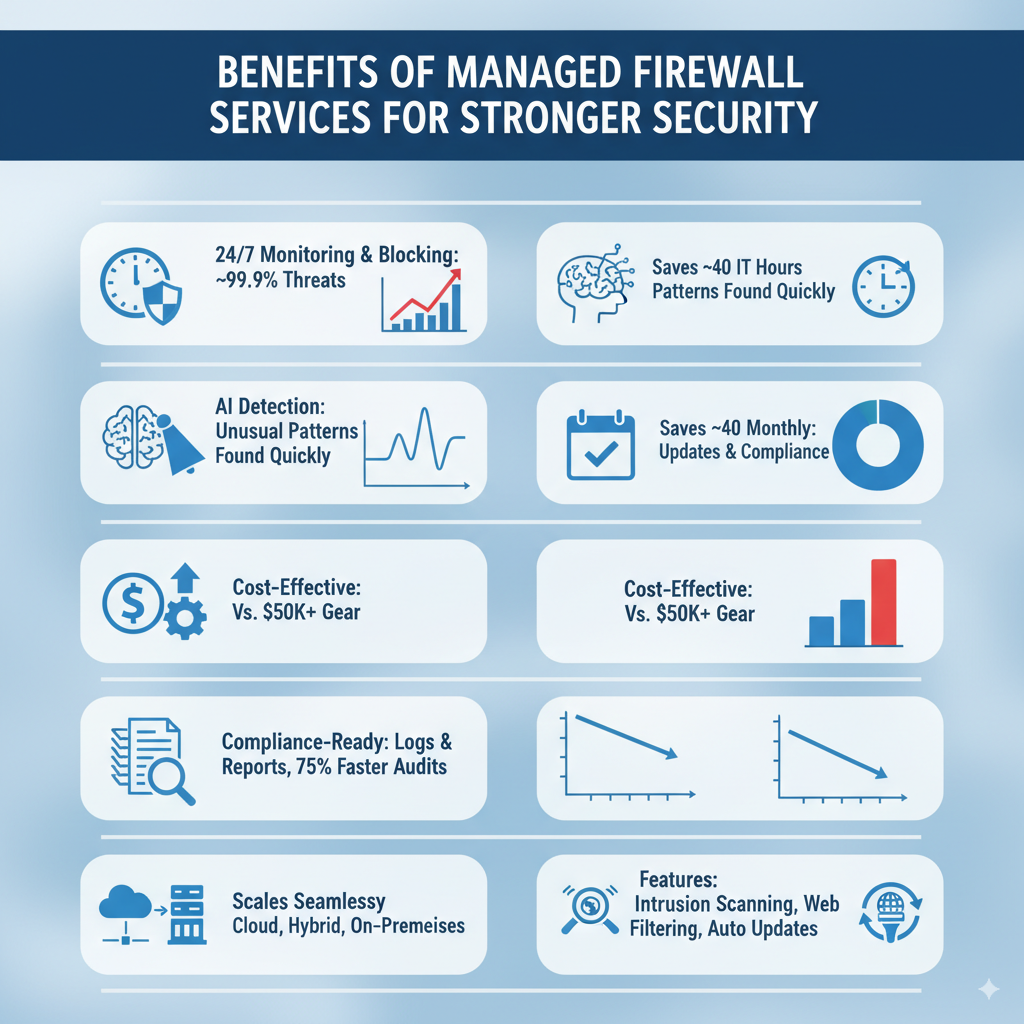Address
304 North Cardinal St.
Dorchester Center, MA 02124
Work Hours
Monday to Friday: 7AM - 7PM
Weekend: 10AM - 5PM
Address
304 North Cardinal St.
Dorchester Center, MA 02124
Work Hours
Monday to Friday: 7AM - 7PM
Weekend: 10AM - 5PM

Nobody’s kidding themselves, network security’s a mess these days. Most companies just don’t have the muscle to handle it right. That’s why managed firewall services make sense, picture having security guards working non-stop, watching your digital doors.
They’re catching the bad stuff 24/7, handling those annoying updates everyone hates, and dealing with all the paperwork headaches. Pretty simple really: they keep the hackers out (stopping about 99.9% of known threats) while businesses do what they’re supposed to do, make money and keep customers happy.
Let’s face it, network security’s a pain these days. Sure, those managed firewall experts keep an eye on things (they catch about 98% of threats within minutes), but what makes them worth the money is how they spot the weird stuff. Not just the obvious attacks, but the tricky ones that usually slip through.
It’s kinda like having that one guard who’s worked the beat so long they can smell trouble coming. Maybe it’s a computer acting funky at 3 AM, or someone trying to download way too much data, the system catches it. They dig through every bit of traffic (around 10 TB daily for most medium businesses), sorta like airport security but actually useful.
You’ll get:

Someone’s gotta watch the shop all night, that’s just how things work now. When stuff breaks, and trust me it will, there’s people ready to fix it. None of that “we’ll look at it Monday” nonsense.
Most IT teams can’t stay up all night watching screens, and they shouldn’t have to. These services keep people on deck 24/7, and when alarms go off, they’re moving while everyone else is dreaming about their weekend plans. They’ve got their playbooks ready and know exactly what to do.
Always on deck:
Most IT teams spend way too much time babysitting firewalls. Numbers show they waste about 15-20 hours weekly just doing updates and fixes. Managed services like MSSP core offerings take over the boring stuff, patches, policy tweaks, those endless compliance reports nobody wants to write.
This lets the tech folks focus on projects that actually move the business forward. In 2025, the global average cost of a data breach dropped 9% to USD 4.44 million, largely due to faster detection and containment driven by security automation. [1]
Here’s what nobody tells you about firewall costs, it’s not just buying the box. Companies shell out big bucks for hardware (usually $50,000+ for enterprise gear), then more for the experts to run it. Managed services flip this around. You pay one fee, kind of like a subscription, and everything’s covered. No surprises, no hidden costs.

Nobody likes dealing with PCI-DSS or HIPAA, they’re a pain in the neck. But these services know the rules inside and out. They keep the firewall settings matched up with whatever regulations apply, so you don’t have to memorize a thousand requirements.
The thing about audits is they always show up at the worst time. These services keep logs and reports ready to go, not the confusing kind, but the ones auditors actually want to see. Most systems can pull reports in under 30 minutes, compared to the usual days of scrambling.
According to recent findings, 71% of organizations reported being at least moderately vulnerable to insider threats, and over half of those experienced six or more attacks in a year. [2]
No more weekend emergencies because someone forgot to update something. Just smooth sailing, most of the time, anyway.

Networks evolve rapidly, adding users, devices, or integrating cloud environments. Managed firewall services adapt seamlessly to growth and change. Whether your infrastructure is hybrid, fully cloud-based, or on-premises, firewall protection scales accordingly without disruption.
Customization extends to user access controls and security policies tailored to business needs. This flexibility ensures that as new threats emerge or compliance requirements shift, your firewall configuration keeps pace.
Our managed firewall plans include:
This adaptability means your firewall remains an asset through every phase of your IT transformation.
Beyond just blocking traffic, managed firewall services offer extended capabilities. Virus and malware prevention, continuous vulnerability scanning, and web filtering all contribute to a layered defense. Policy automation enforces rules consistently, reducing human error.
Automatic updates keep firewall software current, defending against emerging threats without manual intervention. This proactive stance reduces vulnerabilities and strengthens your security posture overall.
Some of these features are:
We find that these automated protections are crucial in staying ahead of fast-moving cyber threats.
Credits: Simplilearn
Finally, managed firewall services provide significant strategic benefits. By optimizing resources and shifting the firewall management burden away from internal teams, organizations can focus on innovation and growth. This shift also supports long-term cost savings and risk mitigation.
Financially, the managed service model replaces unpredictable expenses with a stable investment that scales. Risk reduction comes from expert oversight, preventing breaches that could result in costly downtime or data loss.
Strategic benefits include:
We believe this approach makes managed firewall services not just a security tool, but a vital business asset.
Managed firewall services strengthen network security by combining AI-driven threat detection, deep packet inspection, and 24/7 expert monitoring. They reduce IT strain, cut costs, and ensure compliance with complex regulations. Scalable and customizable, these services grow with your network, turning cybersecurity into a strategic advantage rather than a reactive task.
Join us today to streamline operations, reduce tool sprawl, and build a firewall strategy that aligns with your business goals.